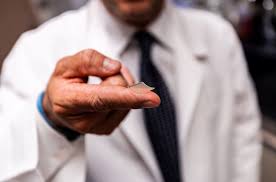Microneedles are tiny needles — their tips are measured in millionths of a metre (micrometer) — designed to break the skin barrier and deliver medicines in a minimally invasive manner. A classic example is the transdermal nicotine patch that delivers nicotine through skin to help people give up smoking.
Project lead, Dr. Sanjiv Sharma of Swansea University, says microneedles provide a safe and effective method to deliver vaccines with added attributes of requiring lower vaccine doses, permitting low-cost manufacturing, and enabling simple distribution and administration.
“A microneedle delivery patch is easy to apply and minimally invasive – combined with the proposed measurement capabilities, this new vaccine system would enable a personalised vaccination approach,” Dr. Sharma said.
This is just as medical experts in Nigeria view the innovation as an affordable replacement to the conventional hypodermic needles, while warning that the new technology should be subjected to clinical trials before using in the country.
The study, published on the university’s weblog, says the device is disposable and can administer the vaccine through microneedles, which simultaneously monitor its efficacy by measuring each individual’s immune response.
The first prototype of the device will be ready in March, and could be made to undergo clinical trials before becoming commercially available in the next three years.
“The researchers’ hope is that this smart patch won’t only prove useful to treat people against the coronavirus, but also other diseases.
“Instead of plunging a regular, hypodermic needle into a patient’s arm, the smart patch’s millimetre-long microneedles would penetrate the skin less invasively while administering the vaccine.
“The patch would be held in place through a strap for 24 hours,” researchers say.
The publication also emphasised that aside from offering immunization against the virus, the smart patch would also measure the patient’s inflammatory response to the vaccine with the aid of biomarkers in the skin.
Responding to the study, a senior medical laboratory scientist and researcher at the Federal Medical Centre, Ebute Metta, Lagos, Saheed Adekola, said such smart innovation must be subjected to clinical trial before it can be deployed for use.
He told PUNCH HealthWise that it was important clinical trials are carried out before deployment for use, as only the outcome could determine the use of such product.
“I think it can replace the hypodermic needle since science is dynamic and there is always a room for discovery, advancement, innovation and improvement.
“For instance, in the past, we used hypodermic needles and syringe for blood collection. But to improve patient and workers’ safety, vacutainers were introduced. They are safer, reduce contamination and the stress usually experienced by patients,” he said.
Continuing, Adekola stressed that beyond the clinical trials, the smart patch device would also need to undergo international and local regulatory testing.
“After it might have been validated by international and local regulatory bodies, in Nigeria, the Medical Laboratory Science Council of Nigeria and the Standards Organisation of Nigeria also need to re-evaluate it before it can be certified safe for use,” he said.
A pulmonologist with the Federal Medical Centre, Abeokuta, Ogun State, Dr. Olusola Adeyelu, also described the smart patch as a novel idea.
“It is very good. The design has a superb worth if it delivers, but it is an old technology used in the administration of analgesics. They now want to adopt it for vaccine dispensing.
“The key words are ‘cheap’ and ‘easy assessment.’ It would be great if it can deliver on its promises,” Adeyelu said.
He was, however, emphatic that the use of hypodermic needles have been phased out before the outbreak of COVID-19.
“Hypodermic needles were phased out long ago, before the coming of coronavirus. The truth is that hypodermic needles can spread infection if not well disposed of.
“If this new device delivers on its stated ambition, the smart patch will also replace the use of needles for immunisation. This is because invasive procedures are being abandoned worldwide,” he said.
Lead study author, Sharma, says once the smart patch scales through the clinical trial, a better and more accurate understanding of each user’s bodily response would be provided.
“Measuring vaccine efficacy is extremely important, as it indicates the protective effects of vaccination on an individual via the level of reduction of infection risk in a vaccinated person relative to that of a susceptible, unvaccinated individual,” Dr. Sharma said.
He also believed that not only would the method of administering the vaccine be less painful, it would also be more accurate and less expensive to administer.
In his evaluation, the smart patch wouldn’t only be useful for the COVID-19 outbreak, but for other infectious diseases, too.
“This low-cost vaccine administration device will ensure a safe return to work and management of subsequent COVID-19 outbreaks.
“Beyond the pandemic, the scope of this work could be expanded to apply to other infectious diseases as the nature of the platform allows for quick adaptation to different infectious diseases,” Sharma said.
source: Punch

 Researchers at Swansea University in the United Kingdom say they are developing the world’s first smart vaccine device that will both deliver the COVID-19 vaccine and measure its efficacy through monitoring the body’s associated response.
Researchers at Swansea University in the United Kingdom say they are developing the world’s first smart vaccine device that will both deliver the COVID-19 vaccine and measure its efficacy through monitoring the body’s associated response.




